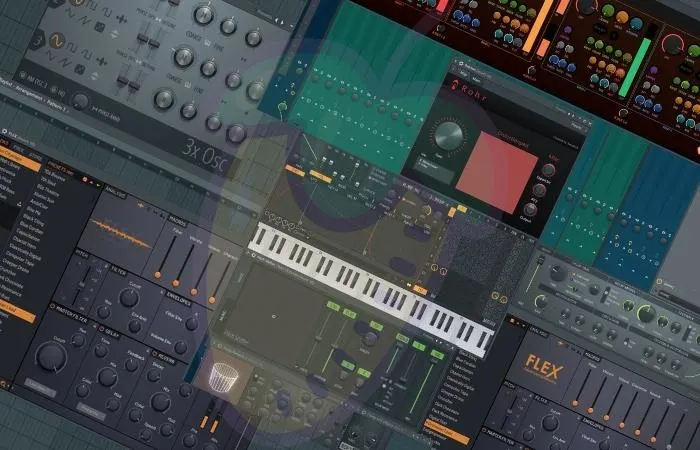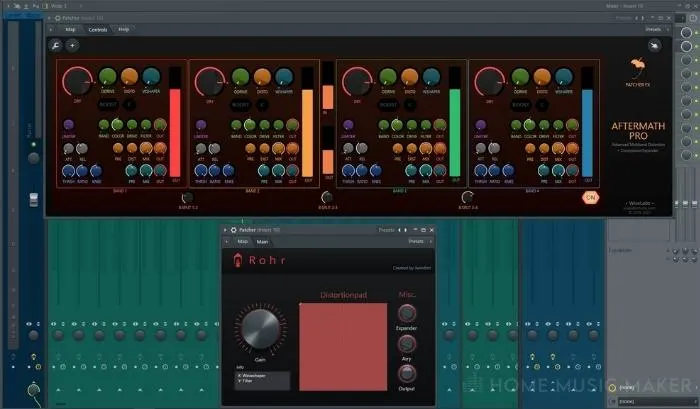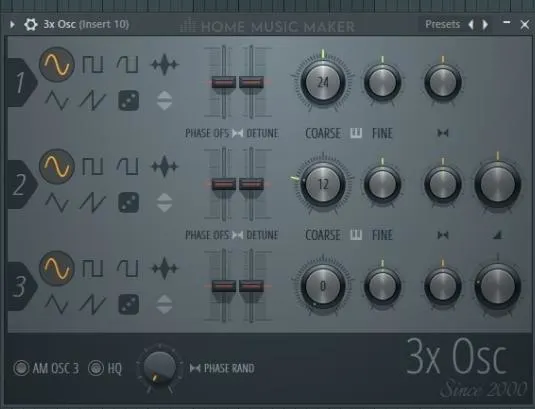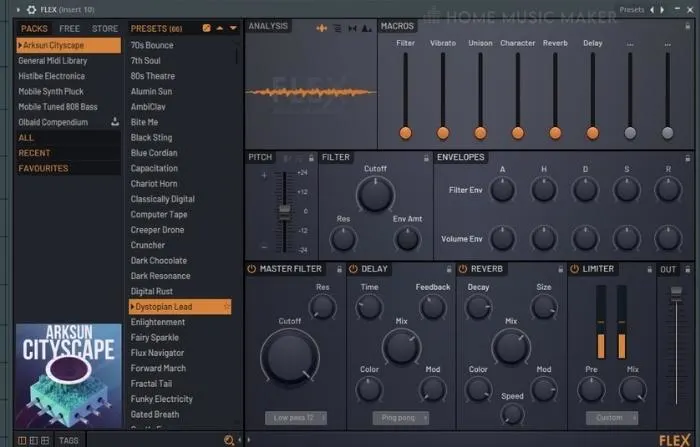With every update, all of the stock FL Studio plugins have increased in quality. They provide users with a fantastic array of top-quality tools for every job a music producer might need. New plugins are constantly added with each update, improving the previous version.
Using Stock FL Studio Plugins
Having high-quality stock plugins is essential for any DAW for modern music production. Luckily, FL Studio has been upping its game in this department over the years.
It now boasts an excellent diverse selection of plugins that can help you out in all types of situations.
In this article, we will discuss how good this selection of stock plugins is, comparing them to other popular DAWs to see if they can hold their own against some of the most highly praised stock plugins out there!

How Good Are FL Studio Stock Plugins?
As mentioned above, Image-Line is continually updating and advancing its roster of native plugins. In recent years they have become some of the best you can get.
Let’s go through some of the stock plugins and see how they stack up against other competition.
Effects
Fruity Loops Studio has got you covered in stock effects plugins. It boasts a truly outstanding selection that can be applied in various circumstances.
FL Studio comes with everything you would expect in creative effects, such as reverb, delay, various filters, distortion, etc. These are very easy to use and look great in their design.
Most of these have seen many updates over the years and continue to get worked on. This also includes added new effects.
They recently added an effect plugin called Pitch Shifter, which allows users to get creative with the pitch of an incoming signal and process it in various exciting ways.
In addition to its effects plugins, FL Studio also features a solid selection of dynamics-based effects plugins. These include compressors, limiters, and EQs that all have a professional sound to them.
The Patcher plugin within FL Studio is also worth noting, is similar to the Max for Live feature in Ableton.
In short, it allows users to chain plugins together in different ways, allowing for an immense wealth of possibilities.
Entire plugins can be made within Patcher alone. Some examples can be seen in the preset once you have an instance of Patcher open.

Compared to other popular DAWs, FLs stock effects plugins are very comparable to the very best of them.
In short, you will be on a level playing field with any of the other popular DAWs out there when it comes to using their native plugins.
Generators
Much of the same can be said in terms of FL Studios’ native generator of synth-based plugins, which are of a very high standard for the most part.
You can find many varying types of synths, from FM to additive, and they all provide users with a great UI design that is easy to pick up and learn.
Some VST plugins are much more straightforward than others. For example, the plugin 3x Osc is a compact synth featuring only three oscillators and a small amount of adjustability. Still, it is an excellent option for simple sound design and beginners looking to learn synthesis.

On the other end of the spectrum, there are native synths such as Sytrus, which is capable of very complicated FM-based synthesis via the use of its mod matrix system.
New editions are frequently being made in this department, with the latest one being a preset-based plugin called Flex. Flex quickly became a favorite for its easy-to-use design and quick preset-based workflow.

All in all, FL Studio offers a fantastic range of stock synths and generators for all music producers, no matter what your level.
Again, stack up well against any of the other major DAWs offerings and, in some cases, offer better options than its competitors.
Other
You can also find other native FL Studio plugins that fall outside of the previously mentioned categories, such as visual aids.
These include dB Meters and sync clocks and more interesting ones such as the ZGameEditor Visualizer.
ZGameEditor allows users to create visuals that can react to the audio being played through FL Studio in real-time. If you flick through the presets, you can see some of the awe-inspiring designs people have created using this software so that it can be a powerful tool in the right hands.
Having plugins such as these included with FL Studio is a great way to elevate it above its competition. Not many other DAWs offer features such as this included with their product.
Do You Still Need To Buy Other Plugins?
Image-Line has done a great job of giving any FL Studio user the tools necessary to start producing music with their selection of stock plugins.
FL Studio easily offers users enough choice and variety to get you on your way if you are just starting.
It is always worth keeping an eye out for third-party plugins that you think could be a good addition to your arsenal as a producer.
There are many great choices that can add even more versatility and quality to your work.
Do Other DAWs Offer Better Stock Plugins Than FL Studio?
For the most part, all popular DAWs like Ableton and Logic feature a similar range of quality stock plugins. So there is not much advantage over choosing a digital audio workstation based on its stock plugins alone.
When choosing which DAW you will use, it is worth considering all of its aspects compared to its competitors that appeal to you the most.
As always, you can download the demo/trial version of the software if you are interested in trying and out and seeing what the stock plugins are like to use.
Related Questions
Which DAWs Have the Best Stock Plugins?
Most popular DAWs are similar in their stock plugins, mainly FL Studio, Ableton, Logic Pro X, and Pro Tools. These feature a wide range of high-quality plugins updated regularly in terms of UI and features, so they are all a great choice.
Some have stronger plugins in certain areas. They all have different designs, so it is worth researching before deciding on your DAW of choice to see whether or not the selection and user interfaces are to your preferences.
Why Are Stock Plugins so Important?
Stock plugins are often discussed amongst the music production community, as they are an essential factor differentiating DAWs.
Another reason they are talked about is that they are likely the first plugins that a user will use when starting to use the software. Maybe how they learn to produce as a whole, so they can be very pivotal.
Do You Need Third-Party Plugins?
When first starting in music production, you will likely be ok using the native plugins that come with your DAW, as they usually include everything you need to get started. After a while, you may find a particular 3rd party plugin that takes your fancy, such as a reverb plugin or virtual instrument.
Ultimately it comes down to the individual and what they are trying to get out of their DAW. Each person will have different requirements from their plugin arsenal. Ultimately you do not need expensive plugins to make music!
Does FL Studio Have an Autotune Plugin?
Fruity Loops features a couple of plugins that allow for the re-pitching of vocals. The first one is Pitcher, and the second is NewTone. Pitcher is a real-time pitch-correction plugin, which means that it can autotune vocals in real-time as the signal is coming into the DAW.
On the other hand, NewTone is a pitch correction plugin that only works with pre-recorded audio. With that being said, NewTone allows for much finer control over autotune. It gives users a much wider array of parameters to adjust in relation to the pitch correction and its settings.
Is Patcher as Good as Max for Live in Ableton?
Both Patcher and Max For Live achieve somewhat similar things when compared side by side. They both allow users to create their own plugins and processers within the DAW.
Max For Live currently has a more active community built up around it, as it is pushed heavily by Ableton. There is a vast array of paid and free Max For Live created plugins that users can get.
In contrast, Patcher has been less talked about until recently, with most users not paying much attention as it looks pretty unassuming from a surface level.
Should I Choose Which DAW I Use Based on The Stock Plugins?
Native plugins are a factor to consider when choosing which DAW you will use. However, you should not let it be the only factor you think of, as there are many other things you need to consider.
For example, the general UI and workflow of each DAW can vary a lot, so it is worth having a go with any you are thinking of using. Using their trial or demo versions can try them out in practice.
Does FL Studio Have Good Plugins for Mastering?
You can find all of the plugins you need for mastering in the stock FL Studio suite, such as compressors, limiters, and EQs. However, you may want some more industry-standard software down the line, as they offer users greater flexibility and generally higher quality.
Final Words
Overall, the suite of stock plugins that FL Studio offers is of a very high standard and competes with the other most popular DAWs on this front.
Producers of all skill levels will find what they are looking for. With new additions being made regularly, it will only continue to get better in the future!
Are you bored of how FL Studio looks? Click here to learn how to change FL Studio skins.

 Want to connect with other music producers for help and guidance?
Want to connect with other music producers for help and guidance?